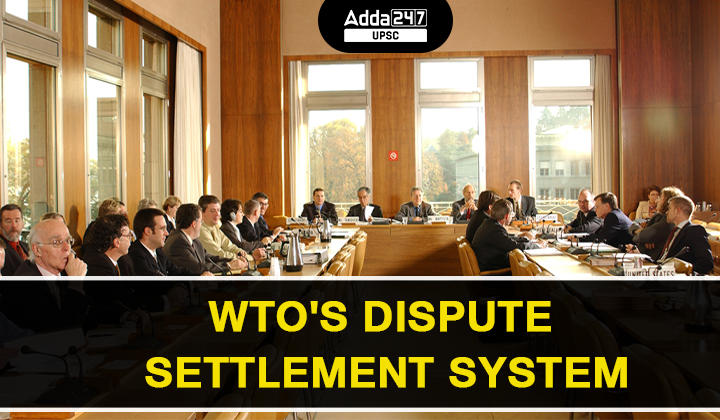Table of Contents
WTO’s Dispute Settlement System: Introduction In June 2022, the member countries of the World Trade Organization (WTO) reached a significant agreement at the Geneva ministerial conference. This deal, crucially supported by India, aimed to revive the WTO’s dispute settlement system (DSS), also known as the WTO’s ‘crown jewel,’ by 2024. Since 2019, the DSS has been paralyzed, primarily due to the United States blocking the appointment of members to the appellate body, the second tier of the DSS. This article explores the challenges faced in resurrecting the DSS and the implications for trade multilateralism.
The ‘Precedent’ Problem
The United States criticizes the appellate body for judicial overreach and exceeding its mandate, arguing that the body has been creating binding precedents through its decisions. However, international law does not have a rule of stare decisis or precedent. The WTO’s dispute settlement understanding (DSU) explicitly states that appellate body rulings cannot alter the rights and obligations of WTO member countries. Nonetheless, the DSU acknowledges that the dispute settlement system plays a vital role in providing security and predictability to the multilateral trading system.
This necessitates consistency in interpretation and application without creating binding precedents. The appellate body has attempted to strike this balance, encouraging reliance on previous interpretations while allowing departures if there are cogent reasons. The argument that this constitutes a common law-style system of precedent is an exaggeration.
De-judicialization of Trade Multilateralism
The larger game plan of the United States appears to be the de-judicialization of trade multilateralism. In a neoliberal economic system, the WTO emerged as the ‘visible hand’ of the law to complement the ‘invisible hand’ of market competition. It provided a legal framework to regulate global trade.
However, de-judicialization seeks to weaken international courts and reclaim decision-making power. This trend challenges the sovereignty of nations, as critical decision-making shifts away from national actors. The United States, motivated by the evolving geo-economic challenges posed by China, aims to exert full control over its trade policies and escape the constraints of the appellate body’s judicial review. De-judicialization should not be confused with exercising political oversight to improve the functioning of the appellate body, as the U.S. has rarely provided constructive suggestions despite identifying multiple problems with the DSS.
On Voting
Negotiating with the United States to reinstate the appellate body is a challenging endeavor. One option proposed by Henry Gao is electing appellate body members through voting at the WTO’s General Council meeting. However, this approach is likely to antagonize the U.S., raising the question of whether countries are willing to take such a path.
Conclusion
The resurrection of the WTO’s dispute settlement system is crucial to maintaining faith in trade multilateralism. However, significant challenges exist, including addressing the ‘precedent’ problem and navigating the U.S.’s push for de-judicialization.
Negotiating with the U.S. to reinstate the appellate body may prove difficult, necessitating alternative approaches such as voting for appellate body members. The road ahead requires careful consideration and collaboration among WTO member countries to uphold the principles of international trade and ensure the effective functioning of the dispute settlement system.
WTO’s Dispute Settlement System Why in the news?
With the United States now hostile towards the WTO’s dispute settlement system, the resurrection of the mechanism by 2024 could face trouble
Relevance for UPSC
UPSC may test candidates’ knowledge regarding trade agreements negotiated by the WTO, such as the Agreement on Trade-Related Aspects of Intellectual Property Rights (TRIPS) or the General Agreement on Trade in Services (GATS). Questions related to the WTO’s dispute settlement mechanism and its role in resolving trade disputes among member countries may also be asked.
Practice Question for mains
Discuss the challenges faced by the World Trade Organization (WTO) in the current global trade scenario. Also, explain the need for reforms to enhance its effectiveness and relevance. (Word limit: 250 words)
| Follow US |
|
| UPSC Govt Jobs UPSC Current Affairs UPSC Judiciary PCS Download Adda 247 App here to get the latest updates |



 TSPSC Group 1 Question Paper 2024, Downl...
TSPSC Group 1 Question Paper 2024, Downl...
 TSPSC Group 1 Answer key 2024 Out, Downl...
TSPSC Group 1 Answer key 2024 Out, Downl...
 UPSC Prelims 2024 Question Paper, Downlo...
UPSC Prelims 2024 Question Paper, Downlo...




